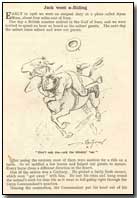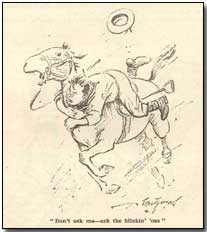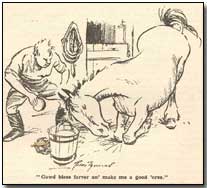Memoirs & Diaries - The Best 500 Cockney War Stories - Jack Went a-Riding and Other Stories
 Published in London
in 1921, The Best 500 Cockney War Stories
comprised, in the words of its newspaper publisher (The London Evening
News) "a remembering and retelling of those war days when laughter
sometimes saved men's reason".
Published in London
in 1921, The Best 500 Cockney War Stories
comprised, in the words of its newspaper publisher (The London Evening
News) "a remembering and retelling of those war days when laughter
sometimes saved men's reason".
The collection of short memoirs, some 500 in total, is divided into five categories - Action, Lull, Hospital, High Seas and Here and There. This page contains five stories from Lull, led by Jack Went a-Riding.
Other sections within the collection can be accessed using the sidebar to the right.
Jack Went a-Riding
Early in 1916 we were on outpost duty at a place called Ayun Musa, about four miles east of Suez.
One day a British monitor arrived in the Gulf of Suez, and we were invited to spend an hour on board as the sailors' guests.
The next day the sailors came ashore and were our guests.
After seeing the canteen most of them were anxious for a ride on a horse. So we saddled a few horses and helped our guests to mount. Every horse chose a different direction in the desert.
One of the sailors was a Cockney. He picked a fairly fresh mount, which soon "got away" with him. He lost his reins and hung round the animal's neck for dear life as it went at full gallop right through the Camp Commandant's quarters.
Hearing the commotion, the Commandant put his head out of his bivouac and shouted, "What the dickens do you mean galloping through here?"
Back came the retort, "Don't ask me - ask the blinkin' 'oss."
H. F. Montgomery (late H.A.G.), 33 Cavenham Gardens, Ilford
Bitter Memories
Durin an attack near Beer-Sheba, Palestine, our regiment had been without water for over twenty-four hours.
We were suffering very badly, as the heat was intense. Most of us had swollen tongues and lips and were hardly able to speak, but the company humorist, a Cockney, was able to mutter, "Don't it make you mad to fink of the times you left the barf tap running?"
H. Owen (late Queen's Royal West Surrey Regt.), 18 Edgwarebury Gardens, Edgware, Middlesex
Tommy "Surrounded" Them
It was in July 1916. The Somme Battle had just begun. The troops in front of us had gone over the top and were pushing forward. We were in support and had just taken over the old front line.
Just on our right was a road leading up and through the German lines. Looking up this road we saw a small squad strolling towards us. It was composed of four Germans under the care of a London Tommy who was strolling along, with his rifle under his arm, like a gamekeeper. It made quite a nice picture.
When they reached us one of our young officers shouted out: "Are you looking for the hounds?"
Then the Cockney started: "Blimey, I don't know abaht looking for 'ounds. I got four of 'em 'ere - and now I got 'em I don't know where to dump 'em."
The officer said: "Where did you find them?"
"I surrounded 'em, sir," was the reply.
Our officer said: "You had better leave them here for the time being."
"Right-o, sir," replied the Cockney. "You hang on to 'em until I come back. I'm going up the road to get some more. There's fahsends of 'em up there."
R. G. Williams, 30 Dean Cottages, Hanworth Road, Hampton, Middlesex
Shell-holes and Southend
My pal (a Battersea boy) and I were two of a draft in 1916 transferred from the K.R.R.s to the R.I.R.s. On the first night in the trenches we were detailed for listening post.
My pal said: "That's good. I'll be able to tell father what No Man's Land is like, as he asked me."
After we had spent what was to me a nerve-wracking experience in the mud of a shell-hole, I asked him what he was going to tell his father.
He said: "It's like Southend at low tide on the fifth of November."
F. Tuohey (late 14th Batt. R.I.R.), 31 Winchester Road, Edmonton
"Make Me a Good 'Orse"
Having come out of action, we lay behind the line waiting for reinforcements of men and horses. The horses arrived, and I went out to see what they were like.
I was surprised to see a Cockney, who was a good groom, having trouble in grooming one of the new horses. Every time he put the brush between its forelegs the animal went down on its knees.
At last in desperation the Cockney stepped back, and gazing at the horse still on its knees, said: "Go on, yer long-faced blighter. 'Gawd bless muvver, Gawd bless farver, an' make me a good 'orse.'"
Charles Gibbons (late 3rd Cavalry Brigade), 131 Grove Street, Deptford, S.E.8
Next - The Lost Gumboot and four other stories
A "Communication Trench" was a narrow trench constructed at an angle to a defensive trench to permit concealed access to the defensive trench.
- Did you know?


